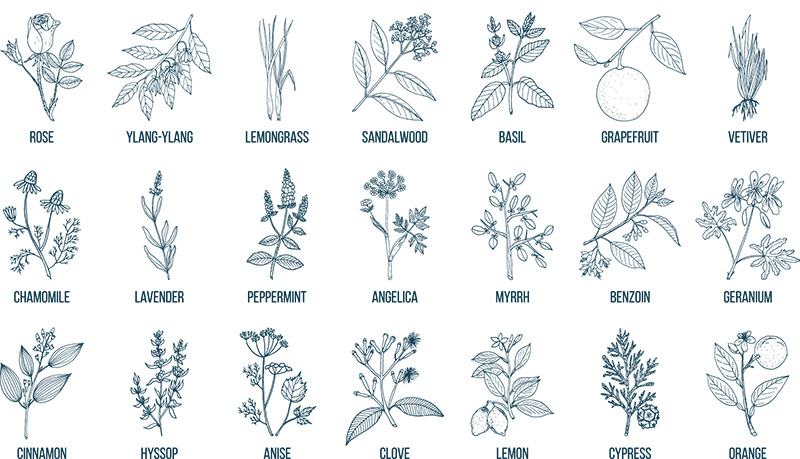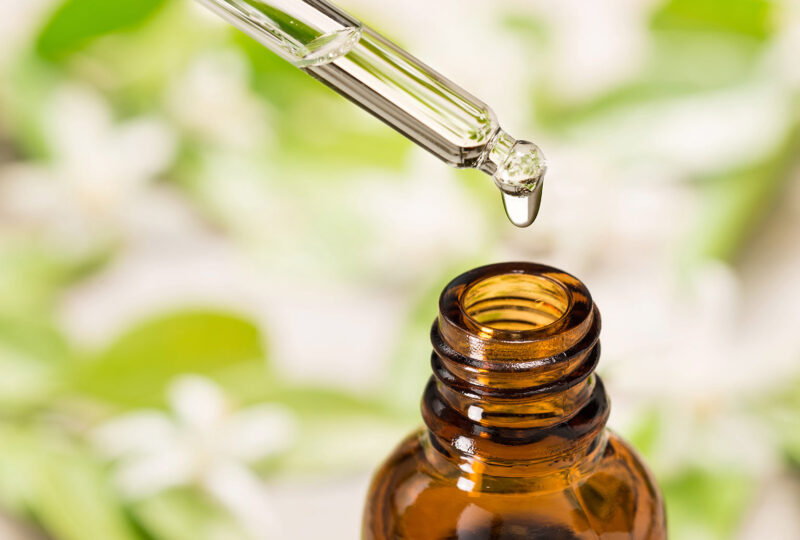Essential oils are an unobtrusive and easy way to improve the health and mood of you and your loved one. As the liquids that come from plants, essential oils are distilled – either through steam or expression (cold pressing) – from various parts of plants, including seeds, bark, leaves, stems and roots. These methods capture the plant’s scent and flavor, or “essence.”
While some controversy exists over some health claims associated with essential oils, there’s little argument around their abilities to improve mood, promote better sleep, relieve headaches and alleviate pain. Essential oils also have well-known antifungal, antibacterial and antiviral properties, and may help improve skin conditions and even ease symptoms of the common cold.
Of course, it takes a lot of plant to make just a tiny bit of oil for human use. For example, it takes nearly 3,000 lemons to distill just more than two pounds of lemon essential oil. That’s why “pure essential oils” are so potent (and at times pricey), but that potency is what makes an essential oil such a powerful plant medicinal.
How to use essential oils
Because essential oils are so potent, experts recommend being mindful about why and how you use them. In fact, a few drops may be all you need to see effects. The easiest way to work with essential oils is to incorporate them into a type of aromatherapy, a type of complementary medicine that involves inhaling essential oils or applying them topically to the skin to improve mood and health. In fact, research has shown aromatherapy to even be helpful in relieving symptoms and conditions associated with Alzheimer’s disease.
Try one of the popular methods of using aromatherapy to help your loved one:
- Evaporation: The natural process of evaporation is an easy way to use essential oils. Open the bottle and inhale a few deep breaths, or apply a few drops onto a cotton ball and inhale the aroma as it disperses. Or, drop a few drops into a bowl of hot water, place a towel over your head, and breathe in the steam.
- Diffuser: An essential oil diffuser allows you to disperse the aroma into large rooms or even an entire home in some cases. Not all diffusers are created equally, so do your homework before you buy. Diffusing essential oils is by far the safest way to use essential oils and also the least physically intrusive, making it an excellent option for those caring for loved ones with dementia who may become confused or agitated with topical application.
- Essential oil spray bottle: Two to three drops into a spray bottle makes for an excellent and portable aromatherapy method. You can freshen rooms or spray pillows, linens and towels. Be sure to purchase an amber or cobalt blue spray bottle to ensure the oils do not spoil from UV rays.
- Use in bathwater or shower: Add a few drops to a steamy bath (no more than two to three drops to a full tub to avoid skin irritations) to enjoy the aromatic steam of the oil. You can also drop a few drops on the floor of the shower for the same effect.
- Aromatherapy beads or inhalation beads: These bracelets and pendants are a fun, popular and stylish way to take aromatherapy with you wherever you and your loved one go. The porous nature of the stone is nature’s way of absorbing the oils.
- Personal inhaler: A personal inhaler can be easily carried in a purse or in the pocket of jeans, and serves as another portable safe aromatherapy method.
What oil should I use?
For anxiety
Research suggests the sweet, uplifting aroma of orange essential oil may help alleviate anxiety. There’s also research suggesting that lemongrass can have an immediate effect on anxiety and tension when inhaled. Ylang Ylang, a very grounding oil, has been found to reduce high blood pressure and stress hormone levels in some people.
For depression
Lavender is well-known for helping to alleviate the symptoms of depression and postpartum depression. It’s a multi-functional oil with well-rounded benefits, including the ability to decrease stress, improve mood and promote relaxation.
For a healing and meditative environment
Sandalwood and frankincense can be used together or alone to create a serene and meditative ambiance. Both are used and revered by many cultures all over the world. Many ancient Indian temples, statuary and sacred objects were made from the aromatic sandalwood, which may calm the mind and alleviate worry by relaxing the central nervous system. Frankincense has a grounding yet stimulating woody, spicy smell, and may play a role in fighting cancer and improving asthma.

For energy
Peppermint, orange and eucalyptus oils may help create an uplifting environment if you need to bring energy to a lethargic afternoon.
For calming down
If you or your loved one are feeling agitated or restless, lavender, ylang-ylang or clary sage may be a good option.
To improve memory and concentration
Numerous lines of research shows the aroma of peppermint can enhance memory and increase alertness. Research also suggests that rosemary can improve cognitive performance and mood. For mental fatigue, try equal parts lemongrass and basil.
To help with cold symptoms and congestion
Eucalyptus is a time-tested remedy for congestion. Tea-tree, peppermint and oregano are also recommended for sinus pressure and congestion.
To alleviate insomnia
Lavender is a leading choice for insomnia as well, primarily due to the chemical compounds found within it, which calm the nervous system. A blend of bergamot, lavender and ylang-ylang has also been found to benefit sleep. Roman chamomile, lavender, and neroli is another essential oil blend for sleep that has been scientifically studied and found to reduce anxiety and improve sleep quality.
Common signs an oil is fake
The FDA does not monitor essential oils, which means the specific compositions of the essential oils are only regulated by the company that sells them. Not all essential oils are created with utmost purity and authenticity in mind. Be on the lookout for a few telltale signs the oil is not the highest quality:
- A label only reads “fragrance oil”
- A Latin name is not present – Lavandula angustifolia is very different from Lavandula latifolia, for example. Simple “lavender” doesn’t cut it.
- A bottle that’s not cobalt blue or amber – Pure essential oil will spoil if exposed to ultraviolet radiation and are therefore stored in only amber or cobalt blue bottles.
- A plastic bottle – The potency of pure essential oils would destroy a plastic bottle.
- An abnormally low price
- Doesn’t list the words “wild crafted” – While most brands carry the official USDA seal, you should also look for an oil that is labeled “wild crafted.” This means the plant was not sprayed with chemicals because it was harvested in the wild (as opposed to being farmed).



